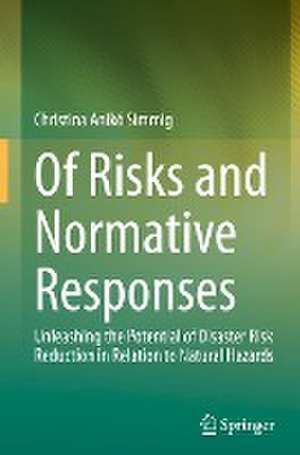Of Risks and Normative Responses: Unleashing the Potential of Disaster Risk Reduction in Relation to Natural Hazards
Autor Christina Anikó Simmigen Limba Engleză Hardback – 24 sep 2023
Preț: 948.92 lei
Preț vechi: 1157.22 lei
-18% Nou
Puncte Express: 1423
Preț estimativ în valută:
181.59€ • 190.94$ • 150.03£
181.59€ • 190.94$ • 150.03£
Carte tipărită la comandă
Livrare economică 16-30 aprilie
Preluare comenzi: 021 569.72.76
Specificații
ISBN-13: 9783031411038
ISBN-10: 303141103X
Ilustrații: XV, 246 p. 4 illus.
Dimensiuni: 155 x 235 mm
Greutate: 0.54 kg
Ediția:1st ed. 2023
Editura: Springer Nature Switzerland
Colecția Springer
Locul publicării:Cham, Switzerland
ISBN-10: 303141103X
Ilustrații: XV, 246 p. 4 illus.
Dimensiuni: 155 x 235 mm
Greutate: 0.54 kg
Ediția:1st ed. 2023
Editura: Springer Nature Switzerland
Colecția Springer
Locul publicării:Cham, Switzerland
Cuprins
1 Introduction.- 2 The Ability to Reduce a Natural Hazard’s Impact and its Perception.- 3 The International Obligations in the Context of Natural Hazards.- 4 The Limitation to Disaster Risk Reduction by Fundamental Rights.- 5 The ‘Better Argument’ in Legitimate Risk Governance.- 6 Conclusion.
Notă biografică
Dr. Christina Anikó Simmig studied law at the University of Hamburg and the China EU School of Law in Beijing and worked as a research fellow at the Institute for International Affairs at the University of Hamburg from 2017 to 2023. She obtained her doctoral degree from Macquarie University and the University of Hamburg in a Joint PhD programme.
Textul de pe ultima copertă
Disaster losses in the context of natural hazards continue to rise, despite a growing understanding of disaster risks and measures to reduce them. One obstacle to enhancing private and public disaster risk reduction is the influence of the distorted risk perception of laypeople. The book argues for the necessity of public regulations and explores means to mitigate the consequences of such distorted risk perception through legal measures and adjustments to political decision-making in Council of Europe member states, while respecting the value of autonomy and democratic principles. In terms of collective decision-making, the book advocates for the implementation of deliberative fora in the democratic decision-making process to mitigate the influence of distorted risk perception associated with natural hazards. Additionally, the book discusses a range of disaster risk reducing measures that member states may lawfully implement to protect individuals and communities from the consequencesof distorted risk perceptions related to common natural hazards. To underscore the merits of strengthening disaster risk reduction from the bottom-up, this book demonstrates how fundamental rights and democratic values impede attempts to increase DRR from the top-down, even in cases where people's risk perceptions are distorted. In doing so, the book addresses the issue of disaster risk reduction in a novel way by exposing how legal and political barriers to disaster loss reduction can be overcome by giving higher priority to mitigating distorted risk perceptions.
Caracteristici
Advances the governmental use of findings from behavioural and communication scientists for risk reduction Discusses in depth several proposals put forward in response to distorted risk perception Interdisciplinary contribution on the legitimacy of targeted responses to seemingly irrational behaviour patterns
